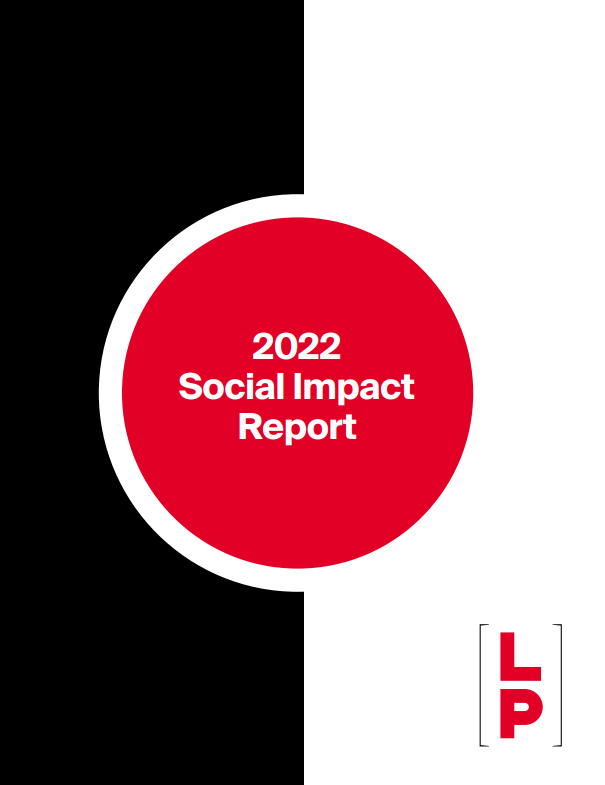Our commitment to social impact is unwavering. When we empower and uplift others, we unlock and see the best parts of ourselves.
1
Social Impact
A Few Words from LP Managing Partner Jeffery Hoffenberg
“We believe that not only is it good for business when businesses support the community, but it is the right thing to do.
Dear Friends,
The past year has been one of change and transition at LP. We have navigated the “new normal” while also undergoing leadership changes—a “passing of the baton,” so to speak, to the next generation of firm leadership. These transitions have prompted LP to double down on our core values, and our commitment to building strong and collaborative relationships is as strong as ever.
Many years ago, LP adopted a policy of contributing to non-profit organizations that are doing good work in the community. We believe that not only is it good for business when businesses support the community, but it is the right thing to do. Therefore, we wanted to be steadfast in our commitment in both profitable and lean years. We are honored to have been unwavering in our pledge to do so. This year’s Social Impact Report showcases the generative impact of the organizations we support through stories of some of the individuals, families, and communities our grant programs have reached. Our grant partners—Cristo Rey Jesuit High School’s Corporate Work Study Program, the Greater Chicago Food Depository’s Job Training Programs, and the Catholic Charities’ House of the Good Shepherd Program—were chosen not based on any beliefs they hold, but because they focus on empowering others to create their own success story.
In addition to the financial support we provide to our grant partners, we’re incredibly proud of and happy to support LP team members who champion their causes independently through significant contributions of time or leadership positions in charitable and civic organizations. We are also gratified to provide pro bono legal services to various individuals and organizations, including immigrants seeking asylum and Hope Chicago.
We do not share this information to pat ourselves on the back. We consider corporate social responsibility to be a baseline expectation. Instead, we share this information and these stories so that you may have a deeper understanding of the exceptional organizations we support.
None of our corporate social responsibility endeavors would be possible without you, and we are grateful for you. By choosing LP, you have afforded us the opportunity to have an impact in our community that could not happen without our clients’ loyalty and our staff’s dedication.
On behalf of everyone at LP, thank you.
Sincerely,
Jeffery Hoffenberg

2
Grant Programs
The bulk of LP’s charitable commitments are dedicated to three organizations with a strong multiplier effect. These are their stories.
Grant Participant Since 2010.
Greater Chicago Food Depository’s Job Training Programs
Job training programs are evolving to meet the changing needs of hospitality and supply chain industries and the program’s participants.
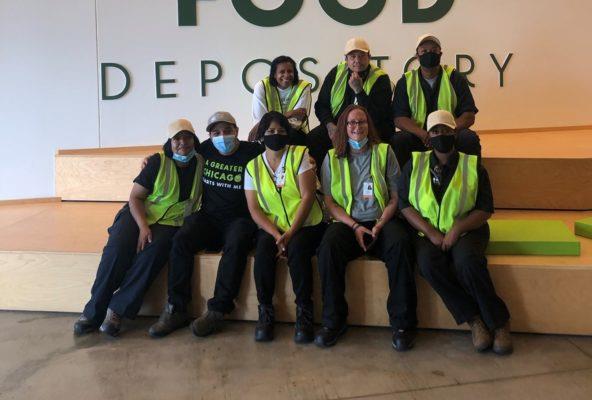
“Since I’ve been in remission, I wanted to get back in the job force, but I didn’t have skills. I found out about the food depository, and it was just a great opportunity for me.
After working various jobs in retail, health care, and childcare, Elizabeth Davis was diagnosed with cancer in 2012. She underwent surgery in 2015, and while dealing with her own health challenges, she was also caring for her mother who has dementia. In 2022, ready to rejoin the workforce, Davis turned to the Greater Chicago Food Depository’s job training and placement programs.
“Since I’ve been in remission, I wanted to get back in the job force, but I didn’t have skills,” Davis said. “I found out about the Food Depository, and it was just a great opportunity for me.”
Earlier this year, she completed the Food Depository’s Certified Logistics Associate training, part of the Supply Chain Career Path Program which prepares unemployed or underemployed Cook County residents for skilled industry jobs.
The Food Depository’s mission is to end hunger. To achieve this mission, the Food Depository works with a network of community-based organizations and individuals to connect neighbors with healthy food, facilitate job training, and advance solutions that address the root causes of hunger—poverty, systemic inequity, and structural racism.
Since 2010, LP has supported the job training programs offered by the Food Depository to support students working towards breaking the cycle of poverty. Job training programs have included Chicago’s Community Kitchens, a culinary training program. When the pandemic disrupted the restaurant industry, the Food Depository pivoted and expanded its job training to meet the evolving needs of the community.
Over the past two years, the Food Depository has facilitated new programs focused on hospitality, supply chain, warehousing, and logistics—sectors that continue to have a high demand for semi-skilled and skilled workers. Students who complete training receive a completion certificate and letter of recommendation to assist with job placement. Sustained support from LP has helped the Food Depository enroll 307 students through new adapted workforce programming, with 259 students completing programs and earning industry certifications.
“Just knowing that someone is with you and rooting for you to do well and then you prove that you can do it, it’s beautiful.
Additionally, this year, the Food Depository incorporated virtual reality forklift simulators into the supply chain training curriculum. Until this year, students in the Supply Chain Career Path of the Workforce Development Program needed to train to operate forklifts using real equipment, which needed to be supervised by staff members and limited the number of forklifts that can be used for warehouse operations. The simulators provide a more cost-efficient alternative that allows operators to hone skills and enhance safety training.
Recognizing that students participating in workplace training programs may have specific needs outside the training program, the Food Depository provides additional resources and support. For example, the Food Depository’s Benefits Outreach team offers information about public benefits and assists students with completing and submitting the Supplemental Nutrition Assistance Program (SNAP) and Medicaid applications, provides transportation assistance to enrolled students, provides wellness/hygiene stipends, and offers counseling and support through Metropolitan Family Services for holistic workshops and one-on-one sessions.
“Just knowing that someone is with you and rooting for you to do well and then you prove that you can do it, it’s beautiful.”
Photos and quotes for this story were provided by the Greater Chicago Food Depository.
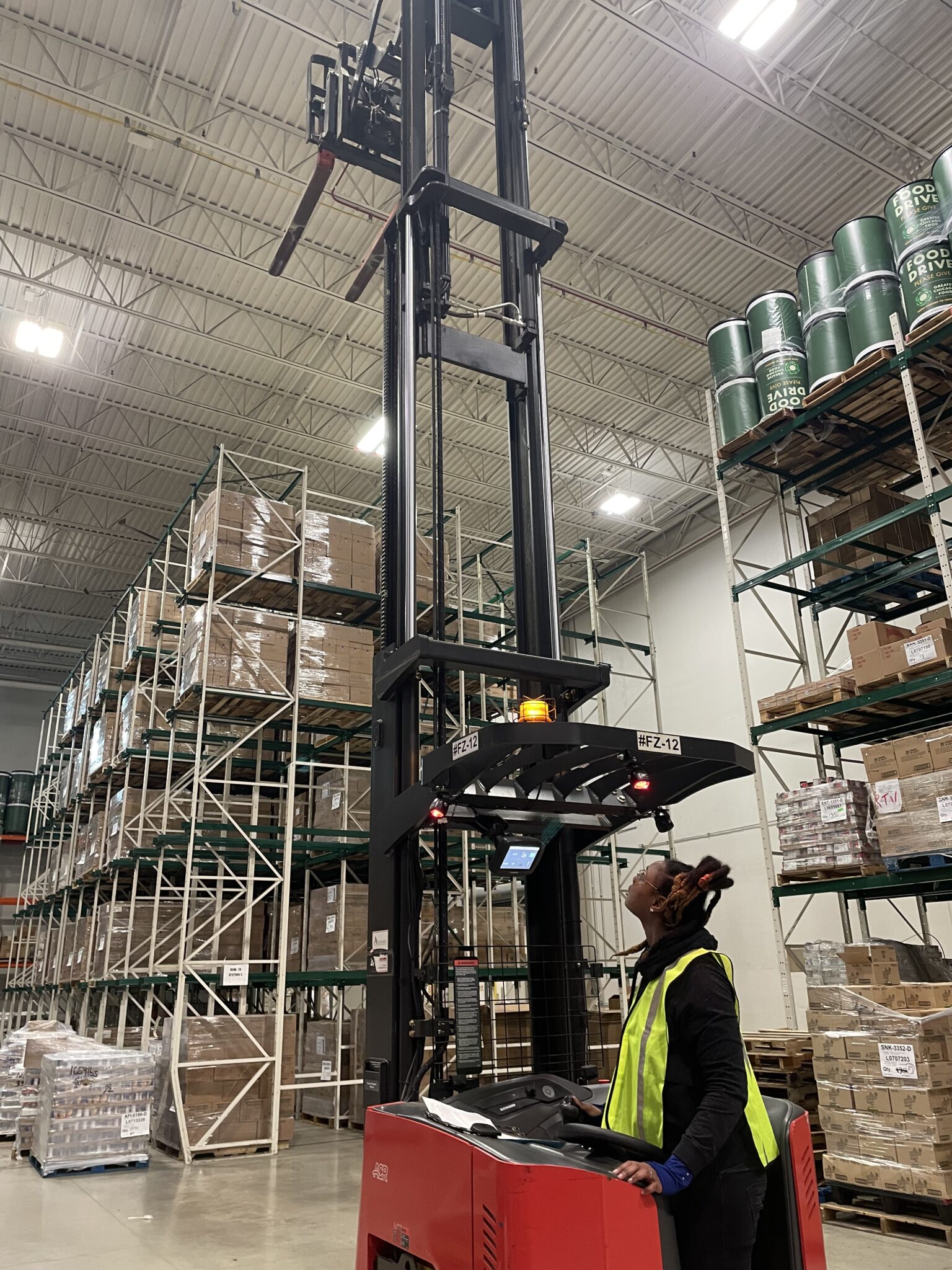
Listen to Kate Maehr, Executive Director and CEO of the Greater Chicago Food Depository, discuss LP’s relationship with the Food Depository and its training programs.
Just the Facts
127
students enrolled in and benefitted from job training programs FY2022 (July 2021-June 2022).
106
students enrolled in and benefited from job training programs in calendar year 2022 to date.
89
students graduated from job training programs in calendar year 2022 with industry credentials – a graduation rate of 84%.
Get in Touch
If you would like to know more about the Food Depository’s training programs, please call 773-843-5414 or click here.
Grant recipient since 2006.
Cristo Rey Jesuit High School’s Corporate Work Study Program
Working with LP, Cristo Rey Jesuit students gain valuable job-readiness skills and work experience along with a tuition scholarship.
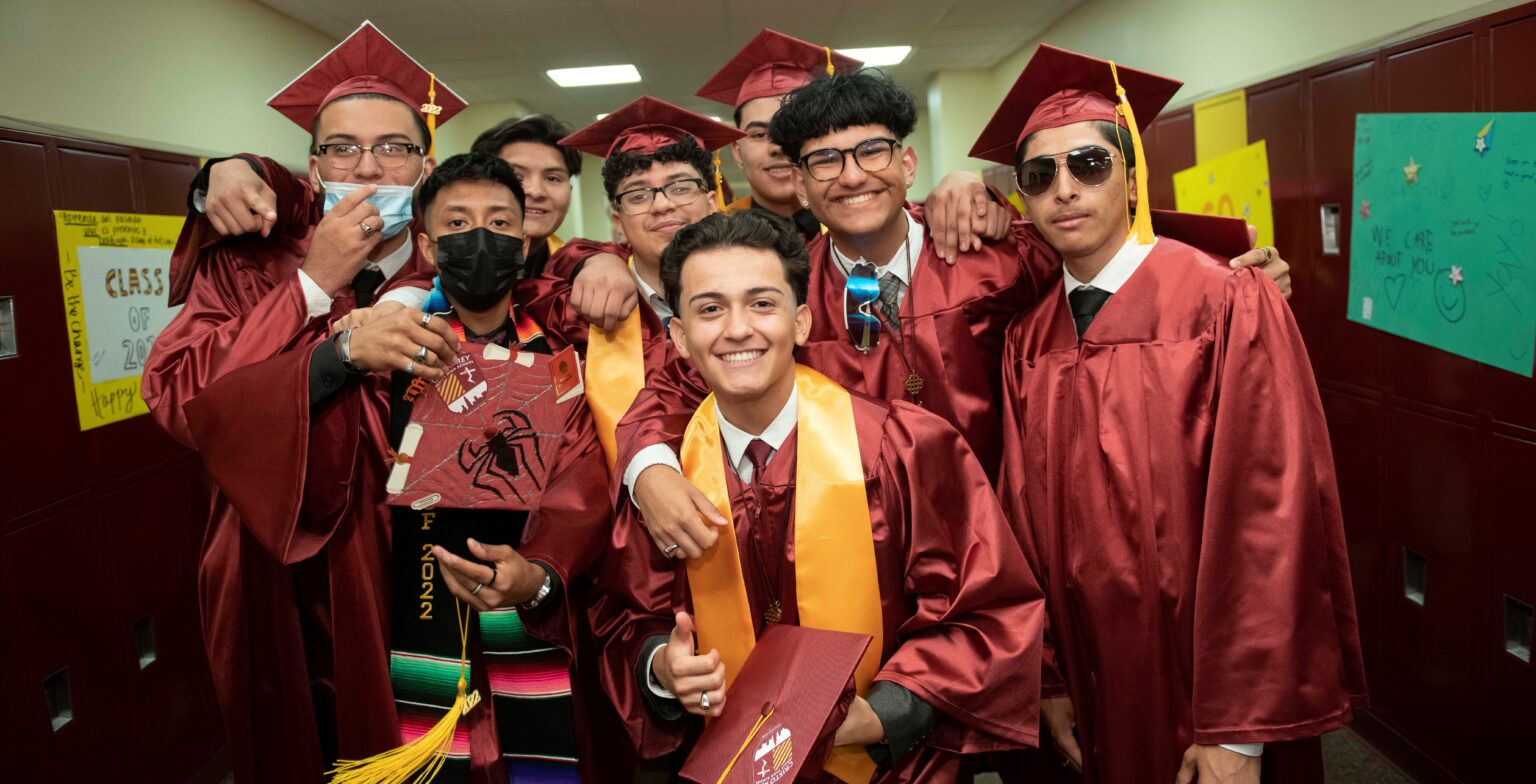
Working at LP has helped me become more responsible and hardworking, not limited to the workplace, but also in school and other aspects of my life,” said Betzy, a student at Cristo Rey who has been working at LP as part of its Corporate Work Study
Program (CWSP). “My timidness no longer gets in the way of working at my best because I quickly felt comfortable with the people around me.”
For the past 27 years, Cristo Rey has served low-income students by providing them with professional work experiences that enable them to take ownership of their education and career to become agents of change. After three school years of pandemic-related disruptions, the past year has been one of invigoration and a renewed commitment to its mission.
LP’s grant is used for the CWSP, a mainstay of Cristo Rey’s innovative approach to schooling. By placing students in professional work environments, the CWSP prepares graduates to become employees and leaders of organizations that would benefit from their life experience and perspective. This year, four Cristo Rey students have worked at LP through the CWSP—two students in the spring semester, and two students who began this fall will work at LP one day a week for the school year.
After the pandemic disrupted CWSP, the program is well on its way to full employment this school year. An impressive 80% of the student population is fully employed, with 3% working remotely. In a massive win for the program, 39% of freshmen are deployed to work, with the remaining freshmen participating in a full day of workforce preparation and skills-building each week.
LP’s grant is used to pay for the tuition of students participating in the CWSP. The cost of education per student at Cristo Rey is approximately $16,000, with families asked to contribute $2,950 toward the cost of education. However, because of pandemic-related disruptions, rising inflation, and other challenges, the average family has paid $1,121 annually.
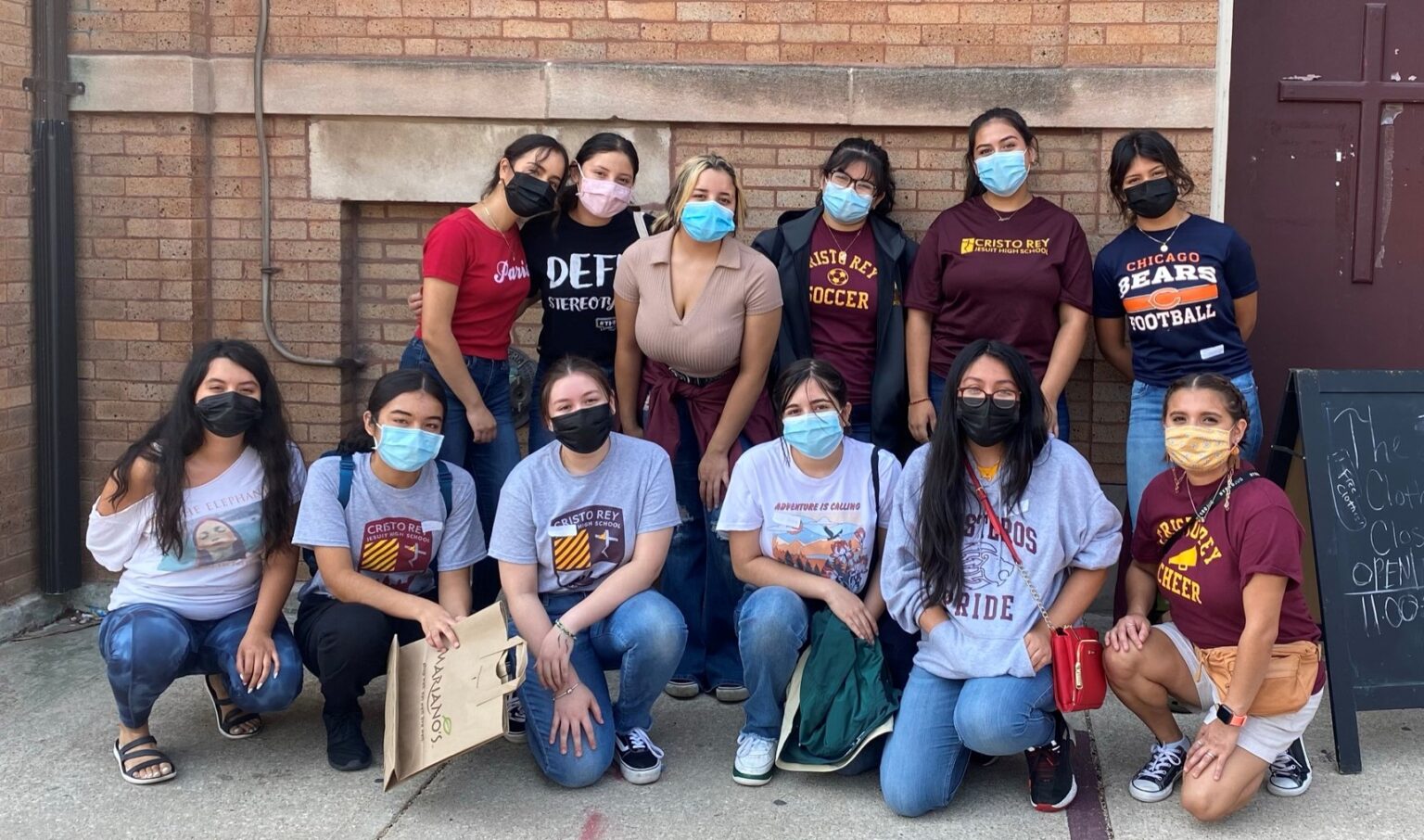
“Working at LP has helped me become more responsible and hardworking, not limited to the workplace, but also in school and other aspects of my life.
Cristo Rey continues to make adjustments to CWSP as necessary to meet the needs of their students and evolving workplace. For example, they switched workdays so that each day corresponds to a single grade level, with freshmen working on Fridays since this is the day with the least demand for student workers. The school has also partnered with external organizations to provide students in training with expanded skill-building opportunities.
Cristo Rey has also continued and expanded its Summer Bridge Program, which was launched in 2021 to help students adjust to a return to in-person schooling. The program was expanded to a full-day, three-week program in July, with mornings dedicated to academic work and afternoons focused on technology and CWSP courses.
In addition to the robust CWSP, Cristo Rey students completed their required 15 service hours, adding value to their communities with 10,000+ hours of service. Students also participate in extracurricular activities and sports at record levels, with 78% participating in 24 clubs and 13 sports. As students became interested in Diversity, Equity & Inclusion (DEI) topics, Cristo Rey created a working group to evaluate DEI within the school community.
The benefits of CWSP are a two-way street, with the students sharing their experiences, energy, and optimism with the LP team. “Working with students at Cristo Rey is an incredible opportunity,” said LP Director of Human Resources Molly Garcia. “Each year, we partner with these impressive high school students, and they always have great energy and curiosity.”
Photos and quotes for this story were provided by Cristo Rey Jesuit High School.
Listen to Cristo Rey President Antonio Ortiz discuss our relationship with the school.
Just the Facts
93%
of the Class of 2021 enrolled in a
two- or four-year institution.
88%
of the Class of 2021 enrolled in a four-year institution – a school record.
96%
of students will be
first generation graduates.
Get in Touch
If you are interested in hiring Cristo Rey students to work for your organization, you can learn more at cristorey.net/cwsp or contact Maureen McInerney, Director of Business Development & Strategy, at mmcinerney@cristorey.net or 773.890.6820.
Grant partner since 2022.
Catholic Charities’ House of the Good Shepherd Program
LP’s grant to the House of the Good Shepherd program supports survivors of domestic violence and their children by providing holistic care, housing, and resources.

“HGS will always be my home.” These are the words of M.F., a mom of two and recent resident at Catholic Charities’ House of the Good Shepherd. After immigrating to the US, M.F. was brutally assaulted by her husband and mother-in-law daily. She eventually sought and found refuge at the House of the Good Shepherd.
Nearly one in three women reports experiencing domestic violence in their lifetime, usually at the hands of an intimate partner. Through programs like the House of the Good Shepherd, Catholic Charities provides comprehensive programming for women and their children to help break the cycle of violence.
This year marks the first year of LP’s grant to support the House of the Good Shepherd, a comprehensive transitional housing program for individuals with dependent children who are facing ongoing problems related to poverty, homelessness, isolation, debilitating trauma, and family abuse. With 14 family apartments and access to legal assistance, childcare, adult learning and financial literacy, and counseling, survivors are accompanied through their healing journey with a focus on economic security, housing permanency, and aftercare with other survivors.
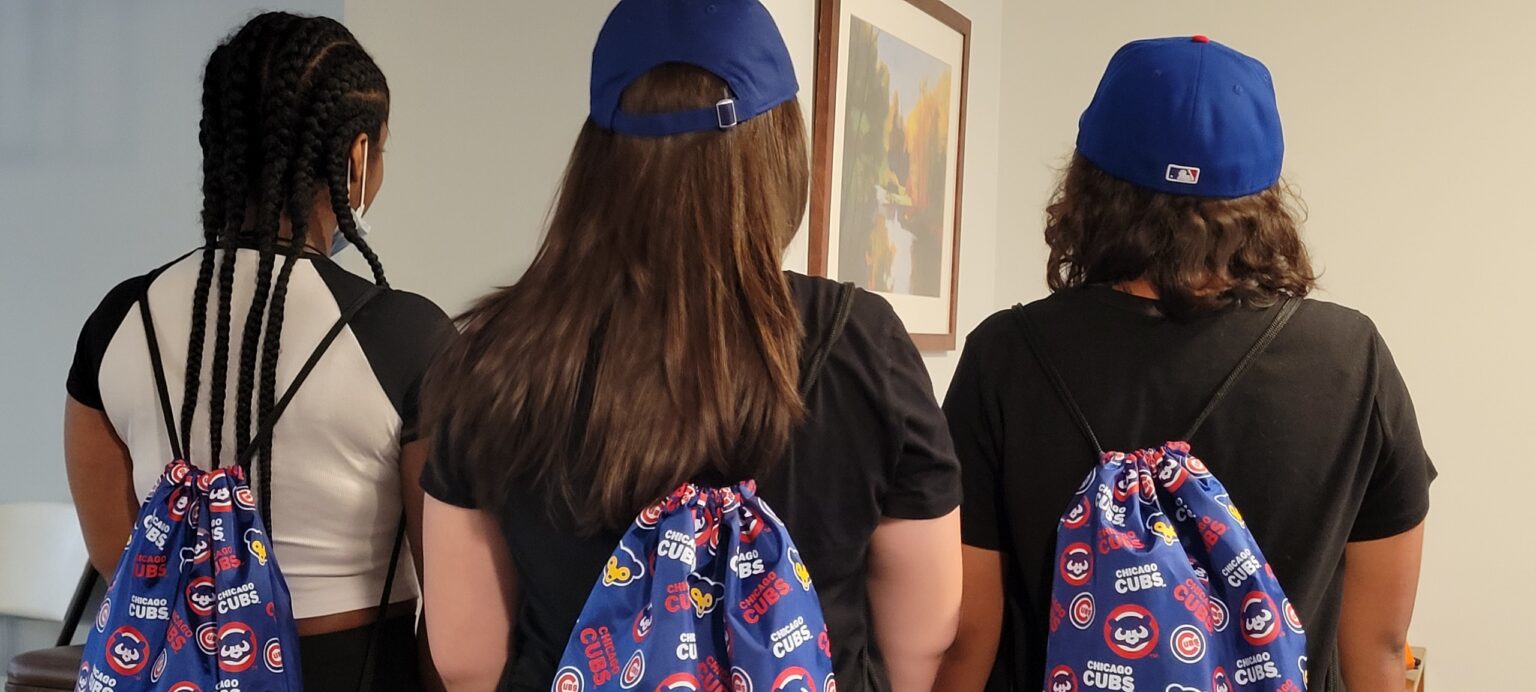
The transitional housing and family violence recovery program helps clients step out of poverty, break the cycle of violence, and embrace a future filled with stable living and self-determination. In addition to its safe environment, the House of the Good Shepherd gives families a designated case manager to develop individualized service plans for success and support services, such as employment assistance, education resources, housing advocacy, economic assistance, counseling, and children’s services.
“While at this program, I learned how to manage my money, I learned how things work here in the USA. I am saving to be my own boss.
The House of the Good Shepherd offers a nine- to twelve-month healing and recovery program that provides emotional support while empowering clients to work toward self-sufficiency. During the program’s first four months, residents focus on their emotional well-being. A service coordinator, case manager, and family activity coordinator work closely with the women and children to help them establish a routine, meet medical needs, enroll children in a nearby school, secure legal assistance, apply for state benefits, and access counseling.
“To me and my family, what was most impactful was the opportunity to learn to be a family,” said M.F. “My children got the opportunity to visit new places, I learned how to play with them, and I learned how to be a mom for them. I also learned that it is okay to ask for help. I also learned to speak English while in this program. I came here not knowing anything.”
Recognizing that financial abuse is present in 99% of domestic violence survivors, the House of the Good Shepherd also provides a financial literacy program that offers women the opportunity to become financially-literate adults who can manage their newfound financial freedom.
Through a partnership with Truman College, one of the Chicago City Colleges, individuals who meet certain qualifications can enroll in GED courses, cosmetology training, or a CNA program. The House of the Good Shepherd also offers an aftercare program that provides continued support through a monthly support group and tangible resources, like food and clothing. Among the 44 families registered in the program in FY2022, 90% are employed full-time.
M.F. recently moved out of the transitional housing provided by the House of the Good Shepherd, a milestone she called “bittersweet.” She is excited to settle into her new home, drive her own car, and start a new job at a hair salon. Her goal is to own a salon in a few years. After owning three salons before she immigrated to the US, she is confident she can do it again.
“While at this program, I learned how to manage my money, I learned how things work here in the USA,” M.F. said. “I am saving to be my own boss.”
Photos and quotes for this story were provided by the Catholic Charities’ House of the Good Shepherd.
Just the Facts
Over 6,500
women and children have
participated in the House of
the Good Shepherd since
it launched one of the first
domestic violence programs
in Chicago in 1980.
15
women received transitional housing and holistic care in 2022.
29
children received transitional housing and holistic care in 2022.
Get in Touch
If you are interested in supporting the House of the Good Shepherd or learning more, you can visit their website at hgschicago.org/get-involved.
Many LP team members provide pro bono legal services or are active volunteers with or serve on the boards of civic and charitable organizations.
3
Giving
LP’s team members support various causes through pro bono work, volunteering their time, and serving in leadership positions with charitable and civic organizations.
Levenfeld Pearlstein’s Day of Service and Pro Bono Program
LP hosted a comprehensive Day of Service in August and continued its robust pro bono programs.
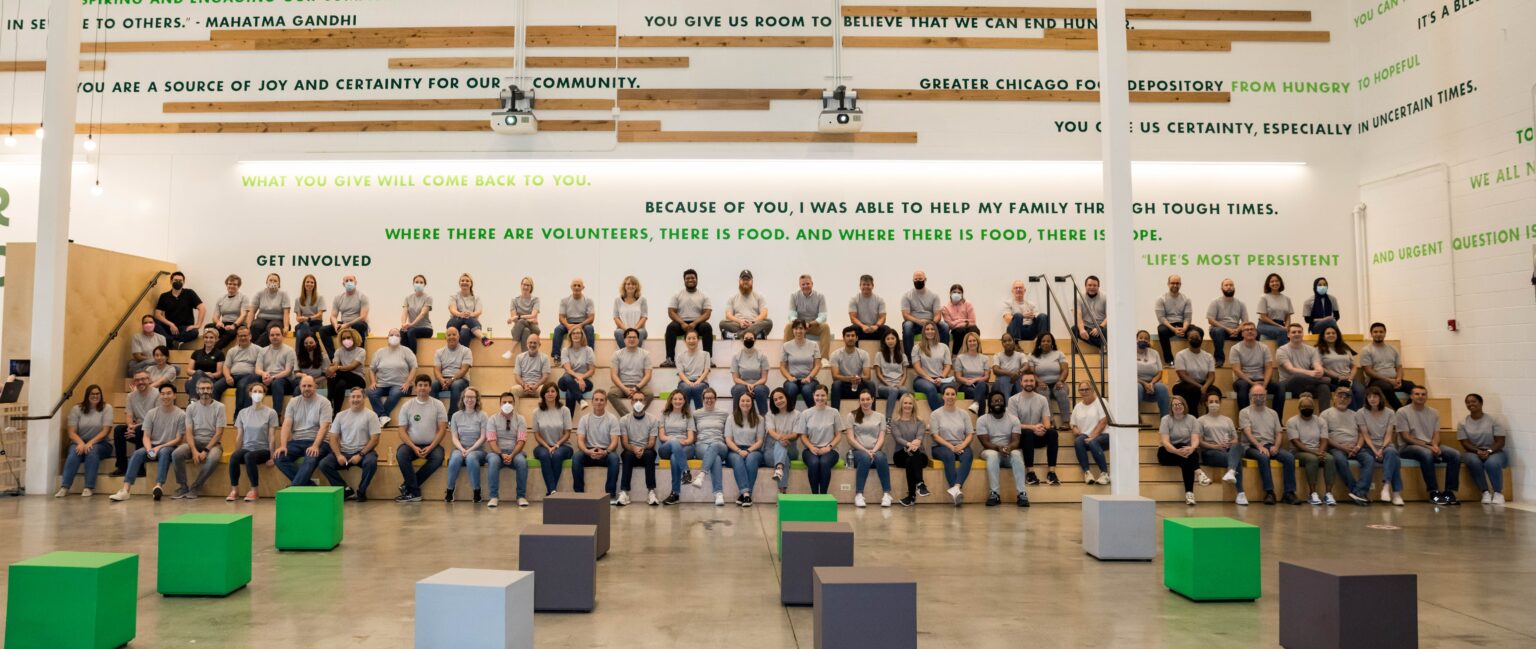
To facilitate connection with each other and with our community partners, LP hosted a Day of Service in August 2022. The day began with representatives from Cristo Rey, Hope Chicago, and the Illinois Holocaust Museum and Education Center sharing information on their missions. In the afternoon, 83 LP volunteers packed 4,545 pounds of potatoes, 18,144 pounds of dried goods, and 4,976 pounds of bread for the Greater Chicago Food Depository. The Food Depository was able to provide 23,054 meals as a result of these efforts.
Volunteer repack sessions at the GCFD warehouse are essential to their daily impact in the community. Typical activities of a repack session include repacking fresh produce and bulk food for distribution, sorting and labeling products, and assembling boxes of assorted food.
In addition to the Day of Service, many LP lawyers and professionals provide pro bono services to clients. Over the past two years, several members have provided pro bono legal services to Hope Chicago, a first-of-its-kind scholarship model serving Chicago students and their parents. Led by former Chicago Public Schools CEO Dr. Janice Jackson, Hope Chicago is committed to raise, invest and deploy $1 billion in college scholarships and support funding over the next decade, effectively creating pathways to economic success for multiple generations of Chicagoans.
Additionally, since 2019, LP attorneys and paralegals have been working with National Immigrant Justice Center (NIJC)—a non-profit organization dedicated to ensuring human rights protections and access to justice for all immigrants, refugees, and asylum seekers— to provide pro bono legal representation to immigrants in various stages of the asylum process.
Many of our attorneys also provide pro bono services to non-profit organizations in the community. Our commitment to pro bono legal representation is centered on a desire to use our legal skills and experience in the legal system to help others.
“83 LP volunteers packed 4,545 pounds of potatoes, 18,144 pounds of dried goods, and 4,976 pounds of bread for the Greater Chicago Food Depository.
The Food Depository was able to provide 23,054 meals as a result of these efforts
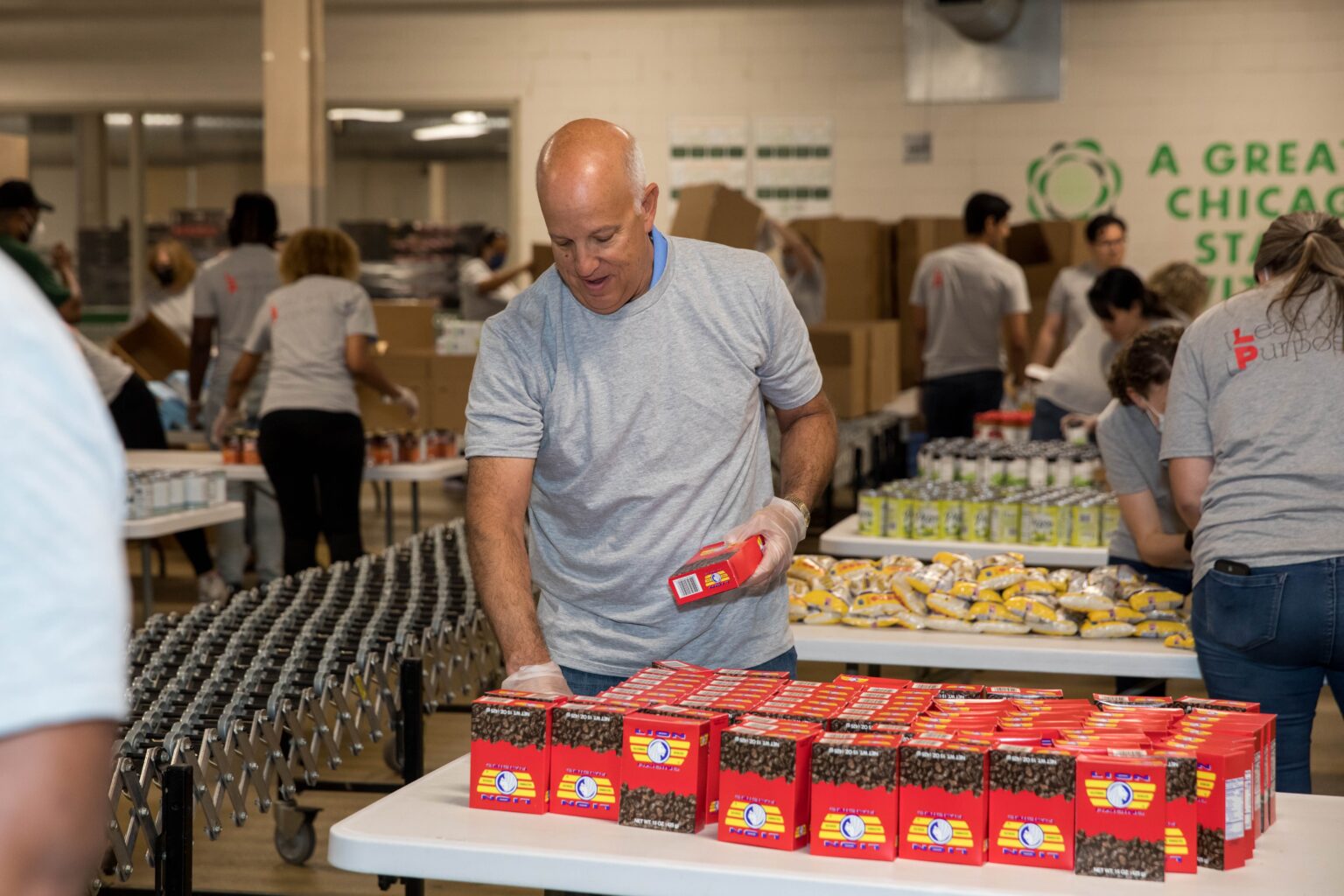
Civic And Charitable Board Support
Many organizations in the Chicagoland area are doing an immense amount of good. In addition to our grant partners, LP’s team members personally support several charities, non-profits, and civic organizations. These are the people who have gone above and beyond by holding leadership positions in or giving a substantial amount of their time to those organizations.
4 Christ Mission
Sun Pae
Board Member
A Giving Heart Foundation
Robert Connolly
Board Member
ACLU of Illinois
Laura Friedel
Board Member
Alzheimer’s Association Illinois Chapter
Mary Wasik
Board Member
David Solomon
Board Member
American College of Trust and Estate Counsel
Lauren Wolven
State Chair
American-Israel Chamber of Commerce (Chicago)
Tal Izraeli
Board Member
Arthritis Foundation
Lauren Wolven
Volunteer
Bulletin of the Atomic Scientists
Robert LoPrete
Governing Board Member and Governance Committee
Chicago Run
Lisa Vandesteeg
Board Member
Chicago Scholars Foundation
Suzanne Shier
Board Member and Executive Committee
Conway Farms Golf Club Foundation
Marc Zaslavsky
Board Member
Credit Abuse Resistance Education (CARE), Chicago Chapter
Harold Israel
Board Member
District 113 Education Foundation
George Spathis
Executive Committee and Co-Chair of Vision & Strategic Planning
Eli and Bessie Cohen Camps of Massachusetts, Inc. and Eli and Bessie Cohen Camps
Etahn Cohen
Chair of Board of Directors, Various Committees
Evanston Children’s Choir
Susan Thomas
Board Member
Friends of the Chicago River
Elizabeth O’Brien
Board of Directors
Friends of Lincoln Park High School
Suzanne Karbarz Rovner
Board of Director
Thomas Jaros
Chair Real Estate Awards Dinner 2021-2022
Michael St. Peter
Associate Board Member
Green City Market
Mitch Weinstein
Vice Chair of Board of Directors, Chair of Governance Committee
Harold Eisenberg Foundation
Marc Joseph
Executive Board Member
Elizabeth O’Brien
Board of Directors
Illinois Holocaust Museum and Education Center
Robert Romanoff
Board of Directors, Executive Committee, and CEO Search Committee
Jewish United Fund
Marc Joseph
Facilities Board Member
Robert Romanoff
Professional Advisory Committee
Kids Hope USA
Suzanne Shier
Board Member and Board Officer
Leadership Advisory Council for Cristo Rey
Katie Haas
Board Member
Misericordia Heart of Mercy
Eileen Sethna
Women’s Board Member, Advisory Board Member
National Center for Employee Ownership
David Solomon
Board Member
New Trier School Board Caucus
Laura Friedel
Chair of Board
Next Generation – United States Holocaust Museum
Jason Hirsh
Board Member
Northern Illinois University
Jeremy Gresham
Member of MBA Board or Executive Advisors
Oak Park Temple B’Nai Abraham Zion
Lauren Wolven
Development Committee
OneGoal
Kevin Slaughter
Member of Chicago Board of Directors
Reflectors Disability Ministry
Becky Jo Morgan
Active Volunteer
Rochelle Zell Jewish High School
Robert Romanoff
Board of Directors, Executive Committee
Special Olympics of Illinois
Eileen Sethna
Board Member and Gala Committee Chair
Spertus Institute for Jewish Learning and Leadership
Harold Israel
Vice Chair of the Board of Trustees
St. Raphael Catholic School
Heidi Kight
Room Mom and School Chair
The Mary Crane Center
Suzanne Karbarz Rovner
Board of Directors
Trillium Foundation
James Brusslan
Board Member
University of Illinois Hillel
Harold Israel
Board of Governors, Chair of Goverance Committee
United States Tennis Association
Mary Ellen Hanrahan
Volunteer
Village of Deerfield – Planning Commission
Blake Schulman
Commissioner
Village of La Grange Plan Commission
Jeffery Hoffenberg
Commissioner
A Closer Look at Hope Chicago with Kevin Slaughter
Kevin Slaughter, a partner in LP’s Corporate Group, has served as outside general counsel for Hope Chicago since 2021. Hope Chicago is a first-of-its-kind scholarship model service Chicago students and their parents.
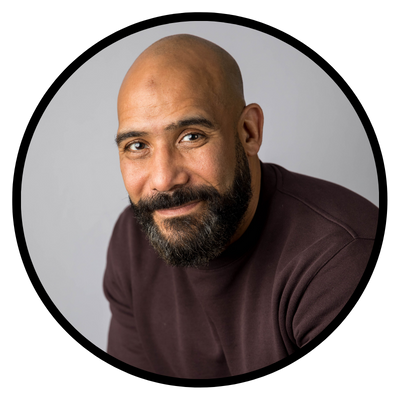
Q: What are Hope Chicago’s primary goals or mission?
A: Led by former Chicago Public Schools CEO Dr. Janice Jackson, Hope Chicago is committed to raising, investing, and deploying $1 billion in college scholarships and
support funding over the next decade, effectively creating pathways to economic success for multiple generations of Chicagoans. Hope Chicago supports economic
mobility for thousands of south, southwest, and west side Chicago families by providing access to a debt-free post-secondary education.
Q: Why do you support/work with Hope Chicago?
A: I, together with the entire LP-Hope Chicago team, serve as outside General Counsel to Hope Chicago. Generally, we provide advice concerning governance matters, intellectual property matters, and data security/privacy matters. We also draft and negotiate agreements between Hope Chicago and its partners, which include Chicago Public Schools (CPS), financial institutions, various service providers and other not-for-profit entities.
As the first member of my family to graduate from college and law school, I understand firsthand the importance of having a support system to achieve educational and professional goals. I have been where the Hope Scholars are now, and I know that education has the power to change the trajectory of a person’s life. But it takes more than education alone; it takes a support network, people who can help you understand the “unwritten rules” of career and professional development, and mentors who can guide you along the way. Hope Chicago provides all these things and more.
Q: What is one thing someone might not know about Hope Chicago or what it does?
A: Hope Chicago is a two-generation scholarship program. Through this program, Hope Chicago provides support for the parents of Hope Scholars to attend college
Q: When did you first begin working with Hope Chicago?
A: Fall 2021
Q: What direct impact have you seen Hope Chicago have on the community?
A: For every 100 students who enter a CPS high school, only 27 will earn a degree. Hope Chicago provides hope for students who, without organizations like Hope Chicago, would have no way to pay for college. As an early proof point of this idea, 74% of Hope Chicago’s first cohort, who graduated high school in 2022, enrolled in postsecondary education, compared with an average historical rate of 57%. The increased enrollment was even larger among students with GPAs of 2.0-3.0, who frequently lack access to the limited other scholarships available. Hope Chicago has highlighted the challenges facing CPS students and has generated a tremendous amount of public support to address these challenges.
Q: What advice would you have for someone who wants to support Hope Chicago?
A: Do it! There are numerous opportunities for direct service providers to provide Hope Scholars the non-financial support they need to pursue their post-secondary ambitions
Q: What are Hope Chicago’s goals for 2023?
A: In 2022, Hope Chicago supported 670 students in enrolling in college or vocational programs debt-free. In 2023, Hope Chicago will support its inaugural class through their post-secondary transition and ensure they return for their second year, as well. Meanwhile, Hope Chicago will support the second class of Hope Scholars — approximately 950 current 12th graders — as they make decisions about their educational futures. As part of the Hope Chicago program, a parent or guardian of each Hope Scholar is also eligible for a debt-free postsecondary education, including degree or certificate programs or shorter-duration job preparation programs. This Parent Scholars program will officially launch in early 2023, as well.
For more information, visit hopechicago.org.
A Closer Look at ACLU of Illinois with Laura Friedel
Laura Friedel, a partner in LP’s Employment & Executive Compensation Group, has served on the Board of Trustees for ACLU of Illinois since January 2022. The ACLU of Illinois is a non-partisan, non-profit organization dedicated to protecting the liberties guaranteed by the U.S. Constitution, the state Constitution, and state/federal human rights laws.
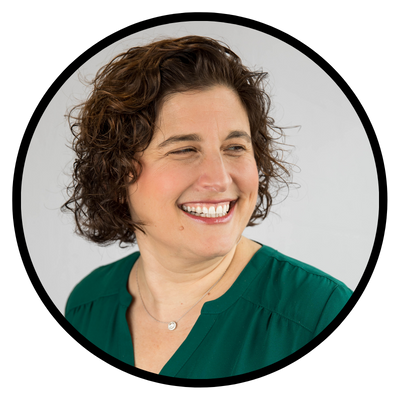
Compensation Group
Q: What are ACLU of Illinois’s primary goals or mission?
A: As a non-partisan organization, the primary mission of ACLU of Illinois (ACLU) is to protect the liberties guaranteed by the U.S. Constitution, the Illinois Constitution, and state and federal human rights laws. The ACLU accomplishes this through litigation, lobbying, and educating the public on a broad array of civil liberties issues. The ACLU’s current priorities include, among other things, voting rights, criminal justice reform, and reproductive health rights.
Q: What is one thing someone might not know about ACLU of Illinois or what it does?
A: While some may associate the ACLU with “liberal” causes, the fact is that the ACLU has long supported constitutional rights across the political spectrum. There have been times when I haven’t agreed with the particular speech the ACLU is protecting, but I always agree with the fact that it needs to be protected.
Q: Why do you support/work with ACLU of Illinois?
A: When I look at the issues I’m most passionate about — voters’ rights, reproductive choice, and separation of church and state — they all come back to our constitutional
rights, and the ACLU is at the forefront of ensuring that these rights are protected
Q: When did you first begin working with ACLU of Illinois?
A: I joined the Board of Directors in January 2022, but have been a member and active supporter far longer than that.
Q: What direct impact have you seen ACLU of Illinois have on the community?
A: In addition to engaging in the legislative process to protect our constitutional rights, the ACLU hosts many information sessions to educate the public on issues that are important to them. For instance, ACLU recently hosted “We the People,” an engagement series to explore the state of democracy, aimed at making our
community better informed and more engaged in the democratic process.
Q: What advice would you have for someone who wants to support ACLU of Illinois?
A: The ACLU has many ways to get involved. Visit the ACLU’s website for links to articles, educational podcasts, and information on educational sessions. The ACLU also posts several specific ways to engage in the legislative process by emailing or calling legislators. For those who are able to financially support the ACLU, donations can also be made online.
Q: What are ACLU of Illinois’s goals for 2023?
A: Among ACLU’s goals for 2023 are advocating for reproductive health rights and protecting vulnerable youth. The ACLU continues to persist in enforcing a consent decree stemming from a 1988 federal class action on behalf of youth removed from their families and deprived of basic services and safe living conditions while in government custody. The ACLU has also broadened its policy advocacy efforts to protect vulnerable youth.
For more information, visit aclu-il.org.
A Closer Look at Green City Market with Mitch Weinstein
Mitch Weinstein, a partner in LP’s Intellectual Property Group, has served in various roles — including Board member (2016-present), Chair of Governance Committee (2017-present), and Executive Committee member and Vice Chair of the Board of Directors (2020-present).

Q: What are Green City Market’s primary goals or mission?
A: The Market’s mission is to secure the future of food by deepening support for sustainable farmers, educating our community, and expanding access to locally-grown food.
Q: What is one thing someone might not know about Green City Market or what it does?
A: We are so much more than a farmer’s market.
Q: Why do you support/work with Green City Market?
A: There are two main reasons: (1) know your food, know your farmer – I want to know where my food comes from; and (2) the Market provides financial support for those who otherwise would not have access to healthy, sustainably-raised foods.
Q: When did you first begin working with Green City Market?
A: I started working with the Market in 2014. I was initially involved in fundraising and community awareness – my love for the Market and its mission grew from there.
Q: What direct impact have you seen Green City Market have on the community?
A: The most visible impact is the Market’s financial support for those who otherwise would not have access to healthy, sustainably-raised foods.
Q: What advice would you have for someone who wants to support Green City Market?
A: First and foremost, shop the Market! And, if you are passionate about supporting sustainable farmers, community education, or expanding access to locally-grown food, you can volunteer at any of our Markets or join the Associate Board or Board of Directors.
Q: What are Green City Market’s goals for 2023?
A: We are always looking to help start-up farmers and expand the number of vendors that sell product at the Market. We are also looking for a permanent (or semi-permanent) home for the Market — stay tuned!
Q: Is there anything else noteworthy or important you’d like to mention?
A: Our impact on the community is growing. In 2022, we supported 58 sustainable farms and food producers, our farmers sustainably farmed 2,600+ acres of land, we donated 7,280 pounds of food to local pantries and mutual aid groups, and over $59,000 of LINK funds were spent and matched with the Market. We are so much more than just a farmer’s market.
For more information, visit greencitymarket.org.
